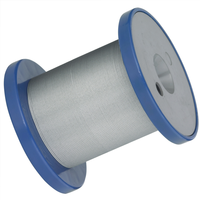Special materials for
exceptional wire rope properties
 We fabricate stainless steel in all grades that can be made into rope, special materials provided they are available as wire rope, nonferrous metals such as copper, bronze, brass, etc., and carbon steel.
We fabricate stainless steel in all grades that can be made into rope, special materials provided they are available as wire rope, nonferrous metals such as copper, bronze, brass, etc., and carbon steel.
In addition to the different grades of stainless steel, our particular expertise lies in special materials. We are renowned for the variety of materials we fabricate and, in part, stock, as well as our extensive consultancy which is tailored to requirements.
In recent decades, numerous special materials have been developed, which are used in the chemical industry, in nuclear engineering, in the aerospace industry, in marine technology, in industrial furnace construction, in medical engineering and in environmental technology, to name but a few.
 Consultancy is always given and selection is always made in accordance with the most up-to-date knowledge in the field of metallurgy. Due to the wide range of conditions that wire rope is exposed to in practice, close cooperation between the user and manufacturer is necessary in order to achieve optimum results.
Consultancy is always given and selection is always made in accordance with the most up-to-date knowledge in the field of metallurgy. Due to the wide range of conditions that wire rope is exposed to in practice, close cooperation between the user and manufacturer is necessary in order to achieve optimum results.
The following list provides a brief overview of the most important special materials. Depending on the area of application, other alloys are used, which we select in cooperation with the manufacturers.
We will gladly provide information about the technical/physical and chemical properties of the special materials on request.
| Heat conductor alloys | |
|---|---|
| Material No.: 1.4828; 1.4841; 1.4860, 1.4864; 2.4867; 2.4869 |
Various nickel-chromium alloys with high electrical resistance and good scaling resistance, for use in heating elements, and variable and starting resistors at temperatures of up to 1150 °C. |
| Corrosion-resistant materials | |
|---|---|
| SUPERAUSTENIT Material No.: 1.4539 |
With this highly corrosion-resistant CrNiMo alloy, we are filling the gap between the standard stainless grades and the nonferrous special materials. Resistant to intergranular corrosion. Higher resistance to stress corrosion cracking, pitting and crevice corrosion than the standard austenitic grades. |
| Highly corrosion-resistant materials | |
|---|---|
| CARPENTER® * Material No.:.4660 |
Nickel-chromium alloy specially developed to be resistant to sulphuric acid corrosion and to be superior to all other austenitic, acid-resistant steels. CARPENTER® performs equally well against phosphoric acid or acid mixtures thereof. Good resistance to stress corrosion and pitting. |
| HASTELLOY® * C4 Material No.: 2.4610 |
HASTELLOY® is a nickel-molybdenum-chromium alloy and is one of the most corrosion-resistant materials available. This material is resistant to a wide range of corrosive substances including hot acids and substances containing chloride or chlorine. |
| MONEL® * Material No.: 2.4360 |
Uniform nickel-copper alloy with good resistance to sea water, sulphuric acid, hydrochloric acid and phosphoric acid. It resists attack from a range of organic and inorganic acids, caustic alkalis and salts in multiple areas of applications. |
| NICKEL 200 und 201 Material No.: 2.4066; 2.4068 |
NICKEL 200 demonstrates excellent resistance to corrosion from caustic alkalis, halides and a range of organic compounds. NICKEL 201 should be used with caustic alkalis in temperatures over 300 °C due to the small amount of carbon it contains. The material exhibits good thermal conductivity. |
| TANTAL | This valuable material has unusually high resistance to corrosion from all acids and chlorine gas. It is resistant to liquid nitrogen. When used as a strand or wire rope, TANTALUM must not be subject to high dynamic loads. |
| TITAN Material No.: 3.7025 |
This material has good corrosion resistance properties and a low weight. It is completely amagnetic and is the material with the highest level of resistance to sea water. Titanium has proved its worth in the aerospace industry, the chemical industry and in the field of medical engineering. |
| Expansion-resistant materials | |
|---|---|
| INVAR® * Material No.: 1.3912 |
This iron-nickel alloy is characterised by its unusually low thermal expansion coefficient – approximately 1/10 of that of steel. Suitable for use as a measuring rope without high dynamic loads, in changing temperatures – including low temperatures – when accuracy is required. |
| Highly temperature-resistant materials | |
|---|---|
| INCOLOY® 825 Material No.: 2.4858 |
A nickel-chromium-iron-molybdenum-copper alloy stabilised with TITANIUM for use under highly corrosive conditions. This alloy is resistant to oxidising and reducing acids. Even in the critical temperature range, INCOLOY® demonstrates good resistance to pitting and intergranular corrosion. |
| INCONEL® 601 Material No.: 2.4851 |
A high temperature nickel-chromium alloy with good resistance to oxidising, carburising and sulphurous atmospheres. Suitable for industrial furnaces and transport facilities, and for use in chemical and process engineering apparatus construction. |
| INCONEL® 625 Material No.: 2.4856 |
A low carbon nickel-chromium-molybdenum alloy, specially developed for use in high temperatures, which is also resistant to a wide range of corrosive substances. INCONEL® 625 does not become brittle due to sigma phase formation in the critical temperature range of 650°C – 850 °C. In addition to industrial furnace construction, INCONEL® is also used in ammonia cracker and gas carburising plants. |
The information given on the material properties described are general statements. In specific cases, there may be slight differences in the individual alloy elements. However, in general these do not affect the performance characteristics.







